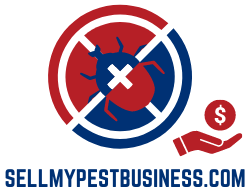How to Determine the Value of Your Pest Control Business (Part 2: Operational and Market Factors)
Explore operational efficiency and market position to enhance your valuation.

Introduction
While financial metrics form the foundation of a pest control business’s valuation, operational efficiency and market factors can significantly influence how buyers perceive its value. Smooth operations, loyal customers, and a strong market presence can set your business apart in a competitive marketplace. This blog dives deep into the non-financial aspects that make a pest control business an attractive investment.
1. Operational Efficiency: The Backbone of Value
A well-run business is more appealing to buyers because it promises a smoother transition and reduced operational headaches.
Why It Matters:
- Efficient operations lead to higher profitability, improved customer satisfaction, and fewer disruptions for a potential buyer.
- Buyers look for businesses that can be easily managed and scaled with minimal effort.

Action Tips:
- Automate Key Processes: Invest in technology for scheduling, billing, and customer management to reduce manual tasks.
- Optimize Service Delivery: Use route optimization software to reduce travel time and fuel costs.
- Document Standard Operating Procedures (SOPs): Create a comprehensive manual for all business processes to ensure consistency and easy onboarding for new owners.

2. Employee and Technician Retention: Your Most Valuable Assets
Your employees are the face of your business and play a crucial role in delivering quality service.
Why It Matters:
- High employee turnover can be a red flag, signaling poor management or unstable work conditions.
- Experienced, well-trained technicians add value by ensuring continuity and maintaining customer trust.
Action Tips:
- Offer Competitive Wages: Retain top talent by ensuring your pay structure is competitive within the industry.
- Provide Ongoing Training: Equip your team with the latest skills and certifications to maintain high service standards.
- Implement Retention Incentives: Use bonuses, profit-sharing plans, or career development opportunities to retain key employees.
Pro Tip:
Highlight employee tenure and certifications in your sales pitch to emphasize operational stability.
3. Customer Retention: Building Long-Term Value
Loyal customers not only provide recurring revenue but also reflect positively on your business’s reputation.
Why It Matters:
- High customer retention rates indicate strong relationships and reliable income streams.
- Buyers see loyal customers as a sign of business stability and reduced risk.

Action Tips:
- Introduce Loyalty Programs: Offer discounts, rewards, or exclusive perks to customers who sign long-term service agreements.
- Focus on Service Excellence: Ensure every customer interaction is positive to encourage repeat business.
- Track Retention Metrics: Use your CRM to monitor customer retention rates and identify opportunities to improve.

4. Market Position: Standing Out in the Crowd
Your reputation and market share play a critical role in determining your business’s value.
Why It Matters:
- A dominant market position reduces competition risks and creates growth opportunities for buyers.
- Buyers are more likely to invest in businesses that are well-known and respected in their local area.
Action Tips:
- Leverage Online Reviews: Regularly solicit positive reviews from satisfied customers and respond promptly to negative feedback.
- Highlight Awards and Certifications: Showcase any industry accolades or certifications that set you apart.
- Engage in Community Involvement: Sponsor local events or partner with community organizations to build goodwill and enhance your brand’s visibility.
5. Growth Potential: The Promise of Future Success
Buyers want to see a clear path for growth that aligns with their goals.
Why It Matters:
- Untapped opportunities can significantly boost your valuation by demonstrating the potential for increased revenue.

Action Tips:
- Explore Geographic Expansion: Highlight opportunities to enter underserved areas or neighboring regions.
- Diversify Service Offerings: Introduce new services such as termite control, wildlife management, or eco-friendly pest solutions.
- Create a Marketing Plan: Develop a roadmap for digital marketing campaigns, social media engagement, and local partnerships to attract new customers.

6. Brand Reputation and Intellectual Property
Your brand identity and proprietary assets are unique selling points that add value.
Why It Matters:
- A recognizable brand with a loyal customer base is more attractive to buyers.
- Intellectual property, such as a trademarked logo or proprietary treatment methods, can provide a competitive edge.
Action Tips:
- Strengthen Your Branding: Ensure your website, logo, and marketing materials present a professional and cohesive image.
- Protect Your Intellectual Property: File trademarks or patents for any proprietary methods or branded materials.
- Highlight Online Presence: Showcase your website traffic, social media following, and online engagement metrics.
Conclusion
Operational efficiency, customer retention, and market position are critical non-financial factors that enhance the value of a pest control business. By optimizing these areas, you’ll not only improve your business’s day-to-day performance but also make it more appealing to potential buyers.
In the next blog post, we’ll outline a step-by-step guide to preparing your business for sale, ensuring a smooth and profitable transition. Ready to take the next step? Visit SellMyPestBusiness.com for personalized support.
